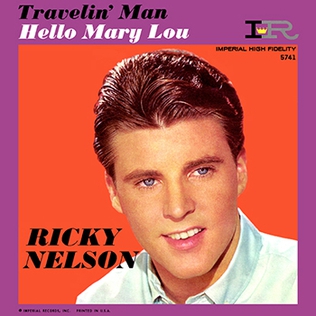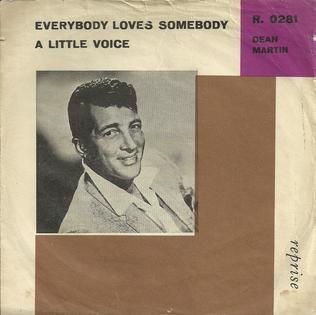Related Research Articles

"Runaway" is a number-one Billboard Hot 100 song made famous by Del Shannon in 1961. It was written by Shannon and keyboardist Max Crook, and became a major international hit. It was No. 472 on the 2010 version of Rolling Stone's list of the 500 Greatest Songs of All Time and No. 466 on the 2004 version.

"Hello Mary Lou" is a song written by American singer Gene Pitney first recorded by Johnny Duncan in 1960 and in the following year by Ricky Nelson. The song was recorded by Ricky Nelson at the famous United Western Recorders Studios on 22nd March, 1961.
"Heartaches by the Number" is a popular country song written by Harlan Howard, and published in 1959. The sheet music was a best seller in both the US and Britain in January 1960.

Gary Wayne Schelton, also known as Troy Shondell, was an American vocalist, who achieved fame in the early 1960s. He became a transatlantic one-hit wonder, by releasing a single that made the record charts in both the US and the UK. The song, "This Time" sold over one million records, earning gold disc status. In a single year, sales were over three million copies.

"A World Without Love" is a song recorded by the British duo Peter and Gordon and released as their first single in February 1964. It was included on the duo's debut album in the UK, and in the US on an album of the same name. The song was written by Paul McCartney and attributed to Lennon–McCartney. The B-side was "If I Were You", written by Peter and Gordon.

"Take Good Care of My Baby" is a song written by Carole King and Gerry Goffin. The song was made famous by Bobby Vee, when it was released in 1961.

"I Will Follow Him" is a popular song that was first recorded in 1961 by Franck Pourcel, as an instrumental titled "Chariot". The song achieved its widest success when it was recorded by American singer Little Peggy March with English lyrics in 1963. The music was written by Franck Pourcel and Paul Mauriat. It was adapted by Arthur Altman. The completely new English lyrics were written by Norman Gimbel.
Paul Evans is an American rock and roll singer and songwriter, who was most prominent in the 1950s and 1960s. As a performer, he had hits with the songs "Seven Little Girls Sitting in the Backseat", reaching No. 9 on the Billboard Hot 100 in 1959), "Midnight Special" and "Happy-Go-Lucky Me".

"Everybody Loves Somebody" is a song written in 1947 by Irving Taylor and pianist Ken Lane, and made famous by Dean Martin who recorded and released his version in 1964.
"You're Nobody till Somebody Loves You" is a popular song written by Russ Morgan, Larry Stock, and James Cavanaugh and published in 1944. The song was first recorded by Morgan and was a hit for him in 1946, reaching the No. 14 spot in the charts. The best known version was Dean Martin's, which was released in 1960 and reissued in 1964.
"Tragedy" is a song by Gerald H. Nelson and Fred B. Burch.

"Just One Look" is a song co-written by American R&B singers Doris Troy and Gregory Carroll. The recording by Doris Troy was a hit in 1963. The Hollies, Anne Murray and Linda Ronstadt each achieved great success with the song. There have also been many other versions.
"I Will" is a song written by Dick Glasser.
"There! I've Said It Again" is a popular song written and published by Redd Evans and David Mann in 1941. In early 1945, Vaughn Monroe and his Orchestra released Victor 20-1637, which reached the number one position on the Billboard's National Radio Airplay chart for five straight weeks, then no.2 for six more weeks, and a total run of 29 weeks. It finished 1945 as the no. 4 record of the year.
"The Door Is Still Open to My Heart" is a 1955 song written by Chuck Willis and originally performed by the Baltimore-based R&B vocal group, The Cardinals. In the US, the original version peaked at number four on the R&B playlist and number ten in R&B sales charts. Later in 1955, Don Cornell recorded the song and released it as the B-side to his hit, "Most of All". The Hilltoppers had a moderate hit with this song the same year.

"Don't Let the Sun Catch You Crying" is a song written by Gerry Marsden, Freddie Marsden, Les Chadwick and Les Maguire, the members of British beat group Gerry and the Pacemakers. It was first recorded and issued as a single by Louise Cordet in February 1964. Shortly after Cordet's version failed to chart, the song was recorded by Gerry and The Pacemakers themselves in April 1964. The Gerry and The Pacemakers recording became an international hit, and remains one of their best known singles.
"Return to Me" is a song with music by Carmen Lombardo and lyrics by Danny Di Minno. The song was released in 1958 by Dean Martin. Martin recorded the song again in 1961 for his album Dino: Italian Love Songs.
"Move Over Darling" is a song originally recorded by Doris Day, which was the theme from the 1963 movie Move Over, Darling, starring Doris Day, James Garner and Polly Bergen, and was released as a single the same year. The song was written by Doris Day's son, Terry Melcher, along with Hal Kanter and Joe Lubin.
"Hats Off to Larry" is a song written and sung by Del Shannon, which he released as a single in 1961. The song spent 13 weeks on the Billboard Hot 100 chart, peaking at No. 5, while reaching No. 1 on Canada's CHUM Hit Parade, No. 2 on New Zealand's "Lever Hit Parade", No. 2 in Australia, No. 6 on the UK's Record Retailer chart, and No. 8 in South Africa.

"Little Town Flirt" is a song by Del Shannon, which he released as a single in 1962 and on the album Little Town Flirt in 1963. It spent 14 weeks on the Billboard Hot 100 chart, peaking at No. 12, while reaching No. 1 on the Irish Singles Chart, No. 1 in Australia, No. 4 on the UK's Record Retailer chart, No. 7 on New Zealand's "Lever Hit Parade", and No. 9 on Canada's CHUM Hit Parade.
References
- ↑ "secondhandsongs.com". secondhandsongs.com. Retrieved June 11, 2021.
- 1 2 Thomas Wayne - This Time, norwegiancharts.com. Accessed July 20, 2016.
- ↑ Leszczak, Bob. (2014). Encyclopedia of Pop Music Aliases, 1950-2000 , Rowman & Littlefield. p. 320. Accessed July 20, 2016.
- ↑ Troy Shondell - Chart History - The Hot 100, Billboard.com. Accessed July 14, 2016.
- ↑ Troy Shondell - This Time, norwegiancharts.com. Accessed July 20, 2016.
- ↑ "CHUM Hit Parade – Week of November 27, 1961". CHUM. Archived from the original on November 7, 2006. Retrieved 2016-07-21.
{{cite web}}: CS1 maint: bot: original URL status unknown (link) Chart No. 242. - ↑ "Lever Hit Parade" 09-Mar-1962, Flavour of New Zealand. Accessed July 20, 2016.
- ↑ "Billboard Music Week Hits of the World", Billboard , December 4, 1961. p. 19. Accessed July 20, 2016.
- ↑ Troy Shondell - Full Official Chart History, Official Charts Company . Accessed July 20, 2016.
- ↑ "allmusic.com". allmusic.com. Retrieved January 26, 2021.